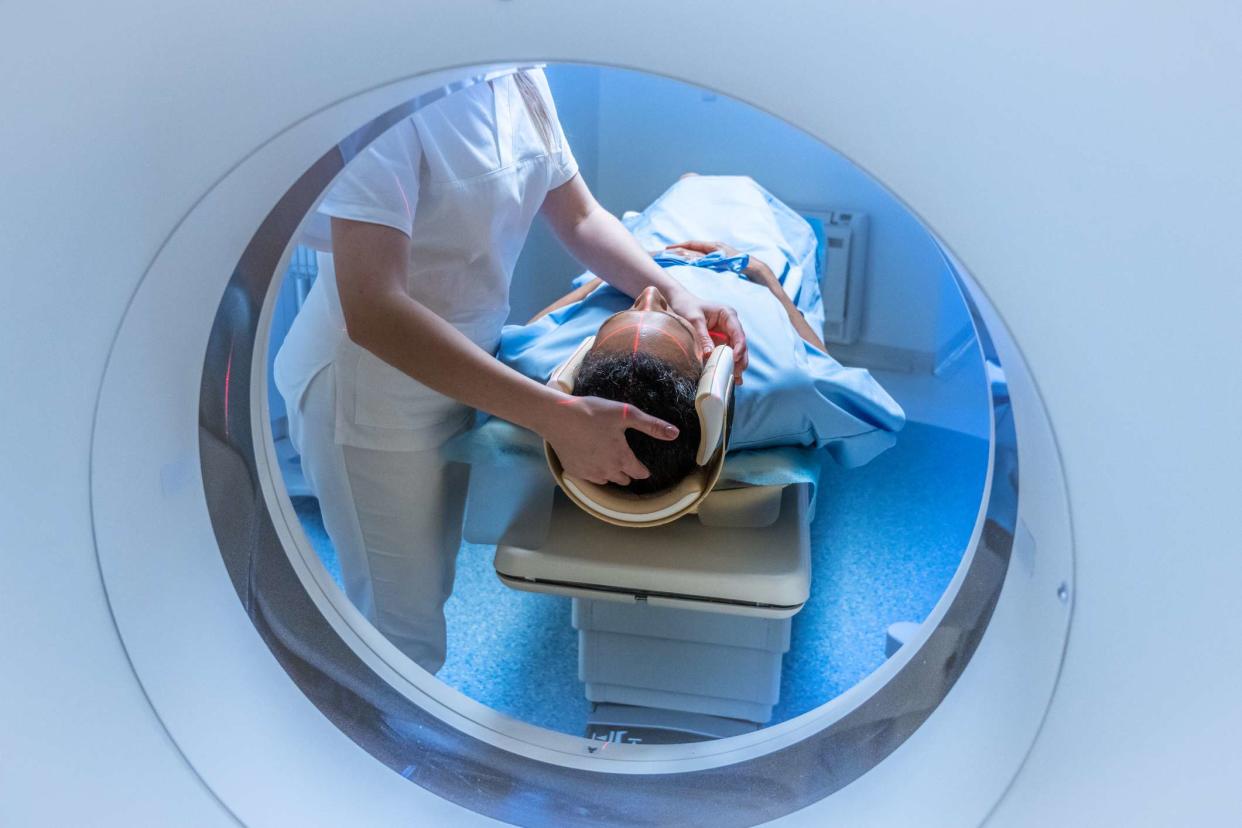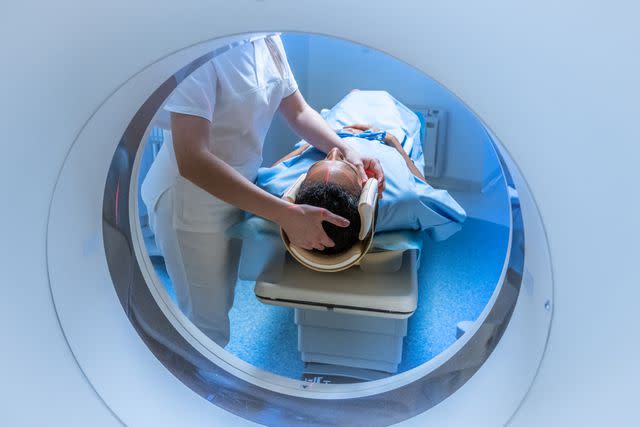Emergency Symptoms of a Sinus Infection That Spreads to the Brain

vm / Getty Images
Medically reviewed by Brigid Dwyer, MD
A sinus infection can spread to the brain through the bloodstream or bone. It is a rare occurrence but incredibly serious. When a sinus infection spreads to the brain, it can cause several conditions like encephalitis, meningitis, or a brain abscess.
This article will discuss how a sinus infection can move into the brain, the signs and symptoms, and treatments. It will also cover the various conditions that are caused by a sinus infection in the brain.

vm / Getty Images
How Does a Sinus Infection Spread to the Brain?
The sinuses, also called sinus cavities, are hollow spaces in the skull surrounding the nose. Sinuses produce mucus that drains into the nose.
A sinus infection produces sinusitis (when the sinus cavities become inflamed). Sinusitis could be due to an infection or other issues like allergies. It is typically caused by a cold that produces a secondary bacterial infection.
The sinus cavities are close to the brain. When someone has a sinus infection, especially in the frontal and sphenoid sinuses, the bacterium or virus can move through the bones or blood vessels and into the brain. This can cause a life-threatening infection.
Warning Symptoms of Sinus Infection in Brain
A sinus infection that has spread to the brain will produce severe symptoms. These symptoms will differ based on the type of infection and where it is located. These symptoms can include:
Sudden high fever
Personality changes
Headache
Altered consciousness
Visual changes
Coma
A brain infection is very serious. While you may not be able to feel the infection move to the brain, the symptoms will become so severe that emergency care should be sought immediately.
When to Seek Emergency Assistance
When sinus infections do not get better or if they worsen, it's time to call a healthcare provider. At the extreme, certain situations would warrant a call to 911 or a visit to the emergency room. If you or someone you know experiences these symptoms, it's time to seek emergency assistance:
Sudden high fever
Stiff neck
Vision changes
Muscle weakness or sensation changes
Seizure
Difficulty hearing or speaking
Headache
Conditions Associated With Sinus Infection in Brain
Several conditions are associated with a sinus infection that has spread into the brain. They are:
Brain abscess
Meningitis
Encephalitis
A brain abscess is a collection of infectious material in the brain surrounded by tissue, forming a fluid-filled pocket. The infection develops when bacteria move from the sinuses to the bloodstream and finally to the brain.
Meningitis is the inflammation of the meninges, the tissue that surrounds the spinal cord and brain. It occurs suddenly, and the symptoms escalate rapidly. Meningitis is a rare but very serious condition.
Encephalitis is inflammation of the brain. It can range from mild to severe, with most cases being mild.
What Is Encephalitis?
Encephalitis is when the brain becomes inflamed. Symptoms can range from mild and flu-like to much more severe. Severe symptoms may include:
Vision changes
Difficulty with speech or hearing
Personality changes
Loss of sensation
Loss of consciousness
Memory loss
Weakness
Seizures
At the Hospital: Treating a Sinus Infection in the Brain
A sinus infection in the brain will need prompt medical treatment by healthcare providers. Treatment will depend on the cause of the infection and its severity.
Encephalitis and meningitis are treated aggressively to prevent brain damage from swelling. There are several types of treatments used. They include:
Antibiotics will be given through an intravenous (IV) line for a bacterial infection.
Antivirals like acyclovir and ganciclovir may be used for viral infections.
Anticonvulsants are used to prevent or stop seizures.
Corticosteroids are used to minimize brain swelling.
In severe cases, a ventilator may be used to support breathing in a person who is in respiratory distress.
A brain abscess is treated with medicine and possibly surgery. If the abscess is small, deep within the brain, or there are several abscesses, then medicine may be the only treatment. Surgery is also needed when the pressure in the brain gets too high, medicine does not work, the abscess is large, or the abscess breaks open.
During surgery for a brain abscess, the neurosurgeon will open the skull, expose the area of the brain near the abscess, and then drain the fluid from the abscess. If the abscess is deep within the brain then a needle aspiration may be used.
Recovering From a Sinus Infection That Spreads to the Brain
Once the infection is under control and the person has stabilized, healthcare providers will focus on their recovery. The recovery from a sinus infection that spreads to the brain will include treatment from a multidisciplinary team of therapists and providers. This includes:
Cognitive rehabilitation
Each provider and therapist will focus on a certain aspect of the body or body system. They will work to help the person regain their abilities lost from the infection.
Summary
A sinus infection is generally a minor inconvenience that resolves on its own or with antibiotics. However, it can cause serious complications if, in rare circumstances, it spreads to the brain. When this happens the infection can cause meningitis, a brain abscess, or encephalitis. Prompt medical treatment is necessary for these life-threatening complications.

